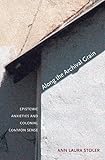Along the Archival Grain : Epistemic Anxieties and Colonial Common Sense / Ann Laura Stoler.
Material type: TextPublisher: Princeton, NJ : Princeton University Press, [2010]Copyright date: ©2008Edition: Course BookDescription: 1 online resource (336 p.) : 8 halftones. 1 mapsContent type:
TextPublisher: Princeton, NJ : Princeton University Press, [2010]Copyright date: ©2008Edition: Course BookDescription: 1 online resource (336 p.) : 8 halftones. 1 mapsContent type: - 9780691015774
- 9781400835478
- 959.8/022
- DS643 -- .S787 2009eb
- online - DeGruyter
- Issued also in print.
| Item type | Current library | Call number | URL | Status | Notes | Barcode | |
|---|---|---|---|---|---|---|---|
 eBook
eBook
|
Biblioteca "Angelicum" Pont. Univ. S.Tommaso d'Aquino Nuvola online | online - DeGruyter (Browse shelf(Opens below)) | Online access | Not for loan (Accesso limitato) | Accesso per gli utenti autorizzati / Access for authorized users | (dgr)9781400835478 |
Frontmatter -- Contents -- Illustrations -- Appreciations -- Chapter One. Prologue in Two Parts -- Chapter Two. The Pulse of the Archive -- PART 1: Colonial Archives and Their Affective States -- Chapter Three. Habits of a Colonial Heart -- Chapter Four. Developing Historical Negatives -- Chapter Five. Commissions and Their Storied Edges -- PART 2: Watermarks in Colonial History -- Chapter Six. Hierarchies of Credibility -- Chapter Seven. Imperial Dispositions of Disregard -- Appendix 1. Colonial Chronologies -- Appendix 2. Governors-General of the Netherlands Indies, 1830-1930 -- Bibliography -- Index
restricted access online access with authorization star
http://purl.org/coar/access_right/c_16ec
Along the Archival Grain offers a unique methodological and analytic opening to the affective registers of imperial governance and the political content of archival forms. In a series of nuanced mediations on the nature of colonial documents from the nineteenth-century Netherlands Indies, Ann Laura Stoler identifies the social epistemologies that guided perception and practice, revealing the problematic racial ontologies of that confused epistemic space. Navigating familiar and extraordinary paths through the lettered lives of those who ruled, she seizes on moments when common sense failed and prevailing categories no longer seemed to work. She asks not what colonial agents knew, but what happened when what they thought they knew they found they did not. Rejecting the notion that archival labor be approached as an extractive enterprise, Stoler sets her sights on archival production as a consequential act of governance, as a field of force with violent effect, and not least as a vivid space to do ethnography.
Issued also in print.
Mode of access: Internet via World Wide Web.
In English.
Description based on online resource; title from PDF title page (publisher's Web site, viewed 30. Aug 2021)


